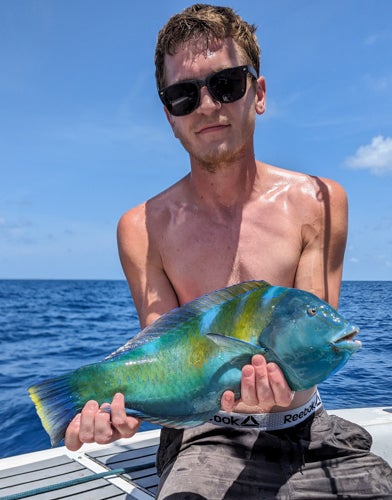Wanna step outside? NC catch could be world record
Published 12:00 am Thursday, September 28, 2023

- North Carolina may have another world-record fish to brag about – of course, if you can brag about a fish you never knew existed. The N.C. Division of Marine Fisheries has announced its first-ever state-record puddingwife wrasse, a fish that will likely break the all-tackle world record. Connor Stone of Southport caught the 3-pound, 11-ounce fish while bottom-fishing off his home port on July 27. The International Game Fish Association lists a 3-pound, 8-ounce fish caught off Key West, Fla., in 2003 as its all-tackle world record. According to NCDMF, Stone plans to apply for the record. The record fish was 18 inches long and 13 inches in girth. Stone caught it on a Fiblink Signature rod and Fin-Nor LTC16h reel spooled with 50-pound braid. He was using squid for bait. If you’ve never heard of a puddingwife wrasse before, don’t feel bad. It’s a reef fish normally found from shallow water out to about 30 fathoms, and North Carolina is the extreme northern edge of its range, which extends south to Brazil. Flounder, delayed-harvest trout seasons close North Carolina fishermen have through Friday to catch flounder in coastal water and through Saturday to catch mountain trout in delayed-harvest streams. The state’s abbreviated season for flounder ends on Sept. 29, having opened on Sept. 15, with a one-fish daily creel limit. The season for keeping trout in the state’s 33 delayed-harvest streams and lakes runs through Saturday, Sept. 30. No trout can be kept from these special streams between Oct. 1 and the morning of June 1. Catch-and-release fishing is still good in the delayed-harvest waters as long as anglers use artificial lures with a single hook. Delayed-harvest waters will be heavily stocked with fish through the fall, winter and spring before the 2024 keeper season opens. Invasive zebra mussels found in North Carolina If having Chronic Wasting Disease show up in North Carolina’s white-tailed deer herd wasn’t enough, now we may have to de
|
Getting your Trinity Audio player ready...
|
By Dan Kibler
For the Clemmons Courier
North Carolina may have another world-record fish to brag about — of course, if you can brag about a fish you never knew existed.
The N.C. Division of Marine Fisheries has announced its first-ever state-record puddingwife wrasse, a fish that will likely break the all-tackle world record.
Connor Stone of Southport caught the 3-pound, 11-ounce fish while bottom-fishing off his home port on July 27. The International Game Fish Association lists a 3-pound, 8-ounce fish caught off Key West, Fla., in 2003 as its all-tackle world record. According to NCDMF, Stone plans to apply for the record.
The record fish was 18 inches long and 13 inches in girth. Stone caught it on a Fiblink Signature rod and Fin-Nor LTC16h reel spooled with 50-pound braid. He was using squid for bait.
If you’ve never heard of a puddingwife wrasse before, don’t feel bad. It’s a reef fish normally found from shallow water out to about 30 fathoms, and North Carolina is the extreme northern edge of its range, which extends south to Brazil.
Flounder, delayed-harvest trout seasons close
North Carolina fishermen have through Friday to catch flounder in coastal water and through Saturday to catch mountain trout in delayed-harvest streams.
The state’s abbreviated season for flounder ends on Sept. 29, having opened on Sept. 15, with a one-fish daily creel limit.
The season for keeping trout in the state’s 33 delayed-harvest streams and lakes runs through Saturday, Sept. 30. No trout can be kept from these special streams between Oct. 1 and the morning of June 1.
Catch-and-release fishing is still good in the delayed-harvest waters as long as anglers use artificial lures with a single hook. Delayed-harvest waters will be heavily stocked with fish through the fall, winter and spring before the 2024 keeper season opens.
Invasive zebra mussels found in North Carolina
If having Chronic Wasting Disease show up in North Carolina’s white-tailed deer herd wasn’t enough, now we may have to deal with zebra mussels, according to the N.C. Wildlife Resources Commission.
The commission announced this past Friday that zebra mussels, a harmful, invasive species, have been found in the wild in North Carolina for the first time — in a body of water in Iredell County.
On Thursday, Sept. 21, the commission got help from scuba divers with the U.S. Fish and Wildlife Service to collect and confirm a report of zebra mussels in a quarry on private property in Iredell County. The commission said it believes the mussels are contained in the quarry and is exploring options for treatment of that body of water.
Zebra mussels are prolific breeders that can move between bodies of water by attaching themselves to boats, motors, boat lifts on docks or other equipment regularly used in the water. They can move between water through diving equipment, livewells, bait bucks, boat bilges and other gear, the commission reported.
Zebra mussels are small, freshwater mussels native to Russia and Ukraine that have been accidentally introduced to other areas around the world. Since the 1980s, they have been found in the Great Lakes, Hudson River and Lake Travis in Texas.
If established in a body of water, they can quickly take over the environment, disrupting the food chain and endangering other species, changing the chemistry of a body of water. They can also clog public drinking and wastewater systems and damage other recreational equipment.
To prevent the spread of zebra mussels, the commission advises cleaning all equipment of all aquatic plants, animals and mud to drain water from boats, livewells and bait buckets, to dry all equipment thoroughly, and never to move fish, plants or other organisms between bodies of water.


